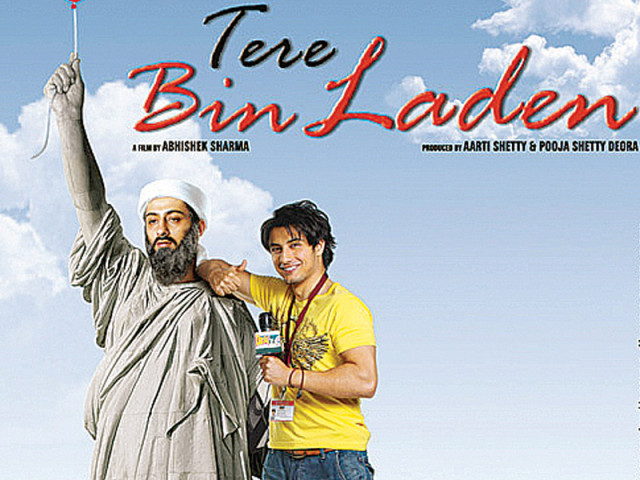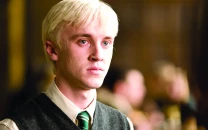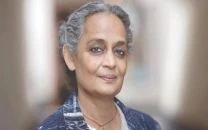Silver screen’s love affair with terrorism
The Express Tribune evaluates Bollywood’s contribution to post 9/11 cinema.

The tears had hardly dried after the fall of the twin towers when screen writers in Hollywood, jumping on the ‘terrorism’ bandwagon, got busy writing some new films.
But no one could have predicted that the late Osama Bin Laden and the World Trade Center tragedy would have such a massive effect on Bollywood, that even film makers who made films like Dilwale Dulhaniya Laejayenge will go on to making films like My Name is Khan.
The dynamic shift in Bollywood was largely triggered by the massive success of the Pakistani film Khuda Kay Liye. Surely, Bollywood film makers realised that if post 9/11 controversy can revive a dead cinema, then it can definitely be profitable for them. Although Indians ventured into exploring this topic quite late, there are still a number of films that Bollywood’s half-hearted and peppered with masala attempt at 9/11 inspired story telling.
The first commercial venture was Nasiruddin Shah’s Yun Hota Tau Kya Hota: What If? Borrowing the title from Mirza Ghalib’s couplet, the story revolves around a group of people from different parts of India who had travelled to the US and board the flights that ultimately crashed into the twin towers and the Pentagon. Despite the fact that it starred great actors like Paresh Rawal, Konkana Sen Sharma, Jimmy Shergil and Irfan Khan, the film was a flop and left very little impact on the audience.
Next came a more avant-garde approach, as John Abraham and Arshad Warsi travel into Afghanistan as correspondents of Star News and end up on a road trip in Afghanistan while meeting a female journalist and a Taliban leader in Kabul Express. Kabul Express is one of the more mature attempts as the director Kabir Khan explores the Afghan conflict in more detail. Ground realities are subtly pointed to, such as the Taliban leader (Salman Shahid) who turns out to be from the Pakistan Army.
Between 2007 and 2009, the Pakistani film Khuda Kay Liye fever spread around and post 9-11 film-making took a totally different turn in the sub-continent. Hence, in 2009 came Karan Johar’s Kurbaan, which was a well thought out and nicely executed take on terrorism. The story revolves around a group of terrorists lead by Om Puri, who are planning to bomb a subway (probably reflecting on the 7/7 blasts). As any Indian film is incomplete without a beautiful woman, Kareena Kapoor falls in love with Saif Ali Khan and tries to ruin the terrorist party, as Vivek Oberoi, a victim of the 9/11 attacks, comes to the rescue. Although the songs made the film pointless, it was still a very slick production from Bollywood.
Next came New York which John Abraham, who stars in it, promoted by saying: “The film starts where Khuda Kay Liye ended.” The film was directed by Kabir Khan and along with John Abraham stars Katrina Kaif, Neil Nitin Mukesh and Irfan Khan. The film begins in 1999 and ends in 2008, as the story revolves around three friends studying in New York, and how one of them strays to become a terrorist after he becomes victim to needless FBI torture after the 9/11 attacks. The film came in very late and had nothing fresh in it apart from the fact that two commercial actors played not very commercial roles.
The latest offerings were the most interesting of them all, as a TV reporter (Ali Zafar) becomes famous by introducing an Osama Bin Laden look-alike in Teray Bin Laden and Shahrukh Khan, despite suffering from Asperger’s syndrome in My Name is Khan, manages to meet the American president and tell him: “My name is Khan and I am not a terrorist”.
Both of these films were commercial successes where Tere Bin Laden earned much more than its small budget and Karan Johar’s My Name is Khan broke the records set by Ghajni.
In retrospect, Bollywood failed terribly at making good films about the post 9/11 era in terms of craft. But by adding Shahrukh Khan and a bit of ‘masala’, they succeeded at selling us even the most ridiculous of ideas, such as an Osama Bin Laden look-alike.
Published in The Express Tribune, May 4th, 2011.



















COMMENTS
Comments are moderated and generally will be posted if they are on-topic and not abusive.
For more information, please see our Comments FAQ